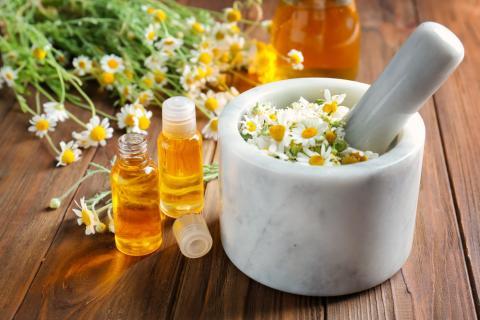
I'm not sure about you, but headaches are definitely an annoyance I don't care for. If they're bad enough, they can really get in the way of me getting work done or simply enjoying myself. Concentration goes out the window when your head starts to pound incessantly. But thankfully, there are many ways to fix a headache holistically. To make things even better, they're super low waste, too. Here are my favorite natural ways to stop headaches that actually work.
Drink More Water
Believe it or not, half the time, getting a headache simply means you’re dehydrated. I cannot tell you how many times I’ve gotten a headache, drank some water, and it’s gone away. Drinking water is always my first go-to solution for a headache because 99 percent of the time, it works. Even studies have shown that chronic dehydration is a common cause of tension headaches and migraines.
The good news is, drinking water can help relieve headache symptoms within 30 minutes to three hours. Usually, since I tend to drink a lot of water anyway, it takes less time for the headache to go away (max thirty minutes). But I suppose it depends on how dehydrated you are, and how much water you need to drink to rehydrate yourself.
Try to get in at least eight cups of water per day to prevent headaches altogether. After all, prevention is the best cure, right?
Use Lavender Essential Oil
Essential oils are amazing for so many different reasons. I use them for all sorts of things, but I particularly love how handy lavender essential oil is. Not only is it a relaxing, soothing scent that can help in aiding sleep, but it’s also great at reducing the symptoms of headaches. Just apply lavender essential oil to your temples and you should be good.
You can also reduce migraine pain and the associated symptoms by applying lavender essential oil to the upper lip and inhaling. If you aren’t a huge lavender essential oil fan, try using peppermint oil on your temples in place of it. It works great at reducing the symptoms of tension headaches as well, all while providing an invigorating scent.
Eat Watermelon
Eating foods with high water content is another great way to reduce a headache’s severity. As we established earlier, drinking more water is important in relieving the symptoms of a headache. However, we also get a lot of our water intake for the day through our food as well. You can increase the amount of water your food provides you by eating water rich foods.
One of the best foods for the job is definitely watermelon. It is 92 percent water, after all. A one-cup serving of watermelon contains over half a cup of water in it. Not to mention it’s also full of good-for-you nutrients, including vitamin C, vitamin A and magnesium. Taking magnesium can help quell a headache, so getting it from the food you eat is a good idea. Evidence suggests people with magnesium deficiency get more frequent migraine headaches, so it’s important to eat foods that help you get your requirement. Since watermelon has both water and magnesium in it, you’re pretty much guaranteed to help reduce your headache severity.
Turning it into watermelon juice is a great way to ingest it, otherwise consider eating it as is, or adding it to your next salad. You can even make gazpacho (i.e., cold soup) with it. Some other foods that are high in water content include celery, lettuce, tomatoes, cucumbers, and peaches. Consider eating these foods whenever you feel a headache coming on, paired with drinking some water.
Drink Herbal Teas
Herbal teas tend to function as herbal remedies for ailments, and headaches are no exceptions. The next time you feel your head pounding, try drinking some lavender, chamomile, elderflower, peppermint, feverfew, hops, skullcap, rosemary, or linden blossom tea. These teas not only taste great but also ease headache symptoms nicely. Plus, drinking lavender and chamomile tea before bed can even relax you and help you fall into a peaceful (headache free) slumber.
You may want to sip some ginger root tea as well. A study in 100 people with chronic migraines found that 250 mg of ginger powder was an effective way to reduce migraine pain. You don’t have to take it in powder form to experience the benefits though—just brew some tea with fresh ginger root instead, making sure to let it steep for 5 to 10 minutes.
Here’s a good herbal tea blend that’ll help ease a headache quickly.
Headache Relief Tea
Feverfew is especially good for migraine headaches. But if you’re pregnant, make this tea with just the peppermint and rosemary.
Ingredients
- 2 parts peppermint leaves
- 2 parts feverfew leaves
- 1 part rosemary
Directions
- Make an infusion, letting the herbs steep for at least 10 minutes. Drink up!
Watch What You Eat
Believe it or not, the foods you eat can trigger a headache. Studies show that food intolerances can trigger headaches in some people. For many people, salty foods, aged cheese, alcohol, citrus fruits, chocolate, and coffee are to blame. The headache may not even start immediately, but come an hour or more after consuming the foods. This can make it tricky to find the direct cause.
However, to discover if a certain food is causing frequent headaches, you might want to try an elimination diet. Here’s how to follow an elimination diet properly. If you already have a pretty good idea which food is specifically causing your headaches, try to avoid it for at least three weeks before slowly reintroducing it back into your diet. You’re going to want to record your findings and watch how your body reacts without the food in your system, opposed to how it acts with the food in your system.
Still suffering from headaches, even after following all this advice? Here are some other natural ways to relieve headaches. Whatever you do, always make sure to put your health first. If you really cannot find relief from any of these methods, don’t be afraid to go to a doctor. Discussing your symptoms with your doctor can benefit you and truly get to the bottom of a headache.








